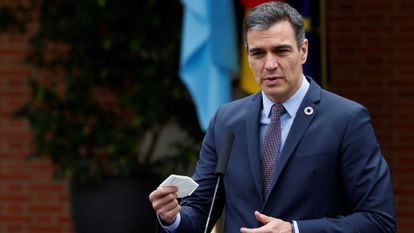In Spain, expiring emergency powers fuel political sparring over what comes next
Courts are issuing contradictory decisions on regional requests for coronavirus restrictions while the opposition is demanding legal reforms. The prime minister, meanwhile, says there are already enough tools in place to control the situation
/cloudfront-eu-central-1.images.arcpublishing.com/prisa/IIY2DZIPAVEKFEVCDOBMP5U7FI.jpg)
The emergency powers used by Spain to fight the spread of the coronavirus have been a source of political friction ever since the first state of alarm was declared in March 2020. But now that this legal framework has expired, the confrontation shows no signs of letting up.
Meanwhile, the legal vacuum has transferred responsibility for approving or rejecting containment measures to the courts, which have been making contradictory decisions in recent days.
The central government has reiterated that there will be no further extension of the emergency powers that have for months allowed authorities to seal off territories, impose curfews, limit social gatherings and shorten business opening hours.
“The state of alarm is the past. We must look to the future, and vaccination is the future,” said Prime Minister Pedro Sánchez of the Socialist Party (PSOE) on Tuesday. A day earlier, the Spanish leader had announced that Spain is “100 days away from group immunity,” meaning that 70% of the population is expected to be vaccinated by August 18.
Sánchez also asked the opposition for “consistency” in its criticism. “They can’t ask for a state of alarm now when they voted against it in the past,” he said, alluding to earlier extensions of the emergency powers that were voted through by parliament. According to the PSOE leader, regional governments already have the necessary tools to impose the restrictions they see fit.

But the main opposition Popular Party (PP) has accused Sánchez of effectively permitting the scenes that were on display in many Spanish cities on Saturday night, when the state of alarm expired and crowds came out to celebrate into the early hours of Sunday morning without social distancing. The conservatives want the government to approve a reform that would provide a broad legal framework for the restrictions being called for by regional governments.
“The government is always going to defend citizens’ freedom,” said government spokesperson María Jesús Montero on Tuesday, shortly after Sánchez’s statements. “The PP is now defending something very dangerous: that governments should all by themselves be able to put limits on fundamental freedoms.”
Instead, the Sánchez administration has issued a decree allowing regional governments to appeal negative rulings before the Supreme Court, which will have to make fast-track decisions unifying the legal criteria.
In the meantime, regional High Courts have been issuing contradictory decisions on requests by regional governments to introduce or maintain restrictions on fundamental rights. In the Valencia region and the Balearic Islands, judges have backed these measures, while in the Basque Country and the Canary Islands, similar initiatives have been rejected.
On Tuesday, the High Court of Navarre struck down a request by the regional government for a night curfew to prevent binge drinking on the streets. The judges said that the need for such a move is not justified and that there are already regular laws in place that need only be enforced.
In Andalusia, the High Court has authorized the confinement of three municipalities but refused to confine a fourth, even though all four have a 14-day cumulative incidence rate of above 1,000 per 100,000 people.
English version by Susana Urra.
/cloudfront-eu-central-1.images.arcpublishing.com/prisa/JB3O5I5MJZGAVNPLMIO7F22E7Q.jpg)
/cloudfront-eu-central-1.images.arcpublishing.com/prisa/RJM3O7ZSEPLKDUYRJTCDBKFM5A.jpg)










































